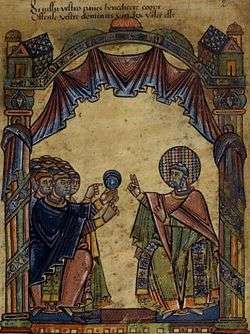Please tell us which country and city you'd like to see the weather in.

Albinus of Angers
Saint Albinus of Angers (French: Saint-Aubin) (c. 470 – March 1, 550) was a French abbot and bishop. Born to a noble Gallo-Roman family at Vannes, Brittany, St. Albinus was a monk and from 504 C.E. Abbot of Tintillac (which no longer stands; its location has not been satisfactorily identified). His reputation spread during the twenty-five years in which he served as abbot. In 529, St. Albinus was elected, against his wishes, Bishop of Angers.
Episcopate
He campaigned against incestuous weddings, such as those that occurred between members of the nobility. He participated in the Third Council of Orléans (538) after King Childebert granted permission for this council to take place. Albinus sought advice from St. Caesarius of Arles after seeing laxity in other bishops.
Tradition states that he helped all in distress, using diocesan funds to free hostages from pirates. Another tradition states that he clashed with King Childebert, who had imprisoned a woman called Etherie, from Douille near Angers. Unable to secure her release Albinus visited her in prison, and the soldier who tried to resist him fell dead at his feet. This so impressed the king that he allowed St. Albinus to bail her out.

Angers
Angers (French: [ɑ̃.ʒe]) is a city in western France, about 300 km (190 mi) southwest of Paris. It is chef-lieu of the Maine-et-Loire department and was, before the French Revolution, the capital of the province of Anjou. The inhabitants of both the city and the province are called Angevins. The commune of Angers proper, without the metropolitan area, is the third most populous in northwestern France after Nantes and Rennes and the 17th in France.
Angers is the historical capital of Anjou and was for centuries an important stronghold in northwestern France. It is the cradle of the Plantagenet dynasty and was during the reign of René of Anjou one of the intellectual centers of Europe. Angers developed at the confluence of three rivers, the Mayenne, the Sarthe, and the Loir, all coming from the north and flowing south to the Loire. Their confluence, just north of Angers, creates the Maine, a short but wide river that flows into the Loire several kilometers south. The Angers metropolitan area is a major economic center in western France, particularly active in the industrial sector, horticulture, and business tourism.
Angers (meteorite)
Angers is an L6 meteorite that hit Pays de la Loire, France in 1822. The meteor struck at 8:15 PM on June 3. It has since been stored along with L'Aigle, another meteorite that struck France 19 years prior, in a room at the Muséum d’histoire naturelle d’Angers, a French natural history museum.
Classification
It is classified as L6-ordinary chondrite.
See also
References
Angers (surname)
Angers is a surname. Notable people with the surname include:
Radio Stations - Angers
SEARCH FOR RADIOS
Podcasts:

